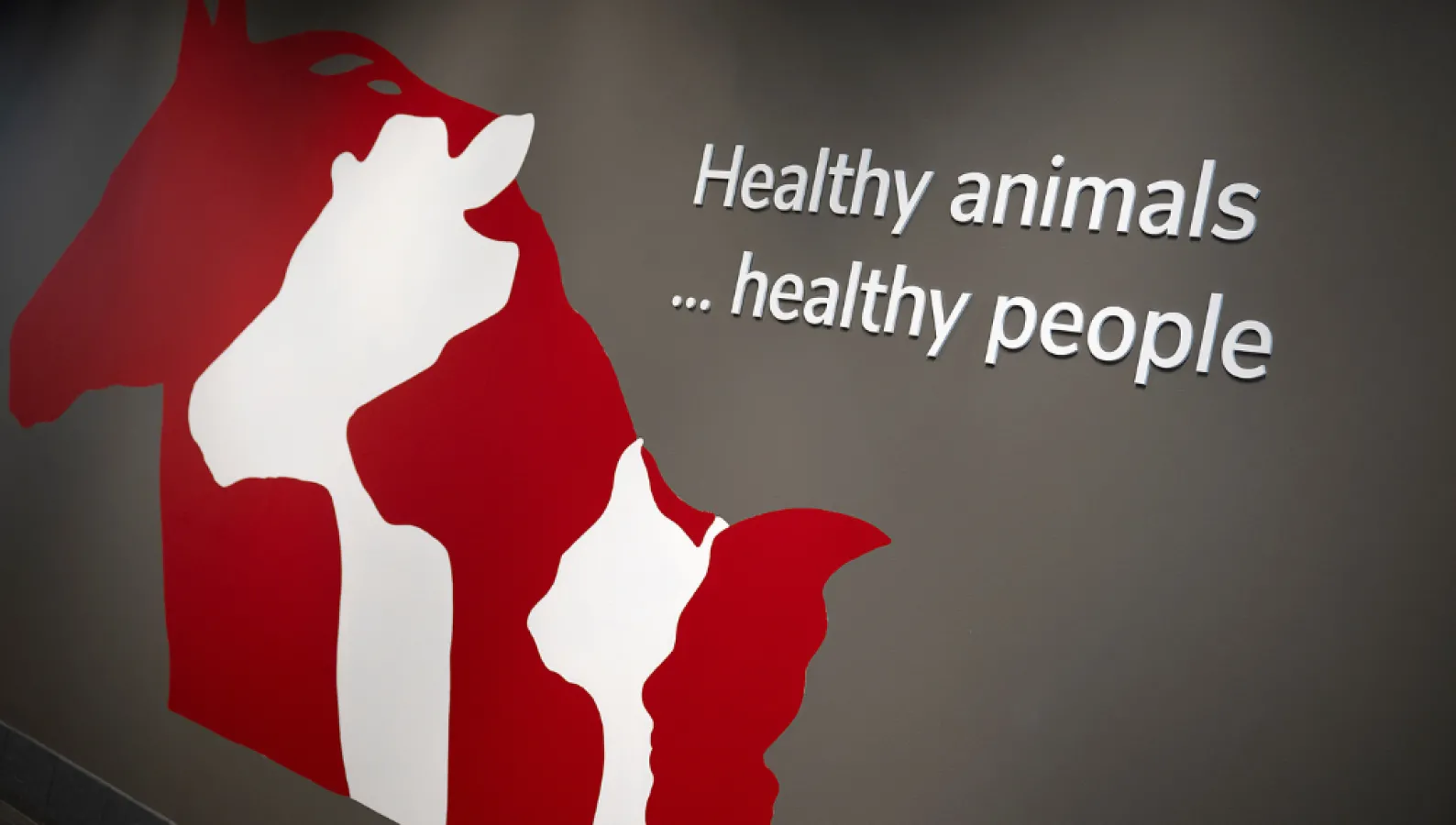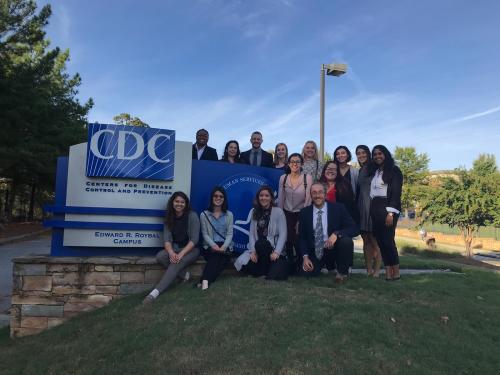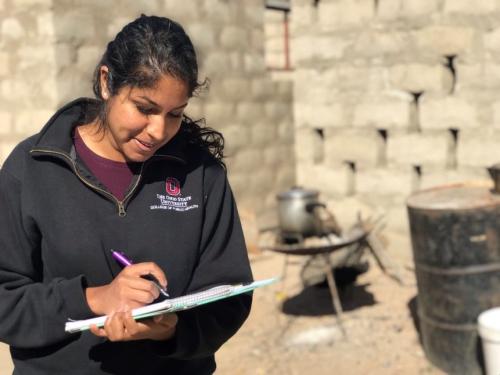Requirements
In addition to core courses and electives, students must complete an Applied Practice Experience or field experience and an Integrative Learning Experience to fulfill the requirements of the MPH-VPH program. Through these experiences, the students utilize classroom knowledge for practical and real-life applications.
Core Courses
- VETPREV 7721: Epidemiology of Zoonotic Diseases
Basic epidemiology of important zoonotic diseases, focusing on their etiology and epidemiology. Common manifestations in humans and animals, diagnostic procedures, and specific preventive and control measures. - VETPREV 7722: Foodborne Diseases, Food Animal Production Systems and Food Safety
Overview of how the food chain for the most common products of animal origin works, with special emphasis on pre-harvest safety, describes most common food-borne bacterial and viral diseases, antimicrobial resistance, HACCP. - VETPREV 7723: Biosecurity, Emergency Response & Outbreak Investigation
An overview of biosecurity, with special emphasis on bioterrorism, preparedness, emergency response, risk assessment, and management of zoonotic and foreign animal disease outbreaks. Regulations and regulatory agencies will also be presented. - VETPREV 7724: Environmental Health at the Human Level Interface
This course will provide an overview of environmental health issues related to human and animal interactions and animal agriculture. Topics will include water and air quality, waste management, occupational safety, and environmental toxicology. - VETPREV 7725: Veterinary Epidemiology & Applied Veterinary Data Analysis
Overview of the basic approaches and philosophies that serve as the foundation for the science and epidemiology as it applies to veterinary medicine with special emphasis on the role of veterinary epidemiology in maintaining human and animal health and the appropriate analysis of animal-human data. - VETPREV 7726: Preventive Medicine Research Design and Methods
Understanding the process used to plan and execute research studies is crucial for students completing their research projects. This course will introduce students to research methods and designs commonly used in veterinary medicine and public health research. - VETPREV 7895: Critical Evaluation of Scientific Literature
Introduces students to critical reading of scientific literature related to veterinary medicine and public health. During class sessions, relevant scientific articles will be discussed and critically reviewed using faculty-guided discussions. - VETPREV 8810: Advanced Concepts & Applications in Veterinary Epidemiology
In-depth exploration of philosophies that serve as the foundation for the science of epidemiology as it is applied to veterinary medicine. Instructor-guided discussions, assigned readings, and application activities. - PUBHBIO 6211: Design Analysis in the Health Sciences II
A second course in applied biostatistical methods with an emphasis on regression methods commonly used in the health sciences. The focus is on linear regression and ANOVA. Integrated with the use of computer statistical packages.
Electives
Students will take ten credit hours of electives for specialization. Advisors will work with students to decide the best combination of electives to make the students competitive in whatever field they choose to enter. Electives can be determined based on recommended tracks, which students can select depending on their ultimate career goals.
- Principles of Food Processing
- Food Microbiology
- Advanced Food Microbiology
- Food Regulations
- Infectious Disease Epidemiology
- Introductory Virology
- Molecular Epidemiology
- Mechanisms of Microbial Pathogenesis
- Public Finance
- Program Evaluation
- Management & Program Development
- Management & Human Relations
- Master Thesis
- Advanced Biostatistics
- Molecular Epidemiology
- Advanced Epidemiology
- Immunology
- Introductory Virology
- Molecular Epidemiology
- Food Microbology
Applied Practice Experience
The Applied Practice Experience (APE) is a graduate-level internship where students apply classroom knowledge to career objectives in a professional setting. Students typically begin the APE by shadowing a VPH professional carrying out their regular duties in any of the five areas of veterinary public health. Some common areas where students complete their VPH APE include zoonotic diseases, food safety, preparedness and emergency response, environmental health, epidemiology, biomedical research and veterinary regulatory medicine. Often, during this 3-week minimum field experience, students take on projects and job duties requisite of professionals in their chosen field. Students should review the College of Public Health website for more information about the APE (CPH APE).
Examples include:
- Analyzing zoonotic disease surveillance data and writing summary reports
- Conducting research in regulatory veterinary medicine and presenting findings at a conference
- Processing lab specimens to aid county-level health departments in identifying and measuring the prevalence of vector-borne diseases such as West Nile Virus in their jurisdiction
Students gain real-world experience that provides a competitive edge when they prepare to enter the workforce. Furthermore, many students find that their APEs turn into job offers. Our graduate students have completed APEs at the local, state, federal, and international levels at institutions such as:
- Columbus Public Health
- London City Health Department
- Los Angeles Health Department
- Ohio Department of Health (ODH)
- Ohio Department of Agriculture (ODA)
- Montana Department of Fish, Wildlife & Parks
- US Food & Drug Administration (FDA)
- US Department of Agriculture (USDA-APHIS-VS)
- Centers for Disease Control and Prevention (CDC)
- US Air Force School of Aerospace Medicine
- National Institute of Veterinary Research
- Ministry of Agriculture & Rural Development
- Ministry of Livestock, Agriculture & Fishery
- University of the Republic of Uruguay
- College of Veterinary Medicine, University of Gondar
- Pan-American Health Organization (PAHO)
- World Organization for Animal Health (OIE)
Integrative Learning Experience
An Integrative Learning Experience (ILE) is developed and executed by the student in conjunction with a faculty advisor and committee to partially fulfill the requirements of the MPH-VPH degree. All ILEs require a written manuscript showing proof of mastery of the curriculum by applying knowledge gained through coursework and the APE.
Students can choose one of two options when pursuing an ILE:
- Thesis Option: Generate new knowledge or science through research
Expectations for students completing a thesis include identifying a research problem, developing objectives and hypotheses, designing an experiment, running the experiment(s) in the field or the laboratory, organizing and analyzing data, and writing a manuscript (thesis) of publishable quality. - Non-Thesis Option: Identify a veterinary public health issue or problem and provide a solution
Students pursuing the non-thesis pathway have multiple options in which the service project can take form. Common projects include but are not limited to, developing risk communication materials or emergency plans, creating educational materials to train public health professionals, conducting applied research and analysis with government and private industry data, or conducting comprehensive literature reviews that fill gaps in knowledge.
Integrative Learning Experiences usually require a year to complete and can take the form of field research, laboratory research, service projects, and comprehensive reviews. These student projects add to the Veterinary Public Health science knowledge base and contribute to solving current human and animal health issues.
Contact the Veterinary Public Health Program
Associate Director, Veterinary Public Health Program
Dr. Amanda Berrian
berrian.4@osu.edu


